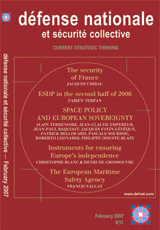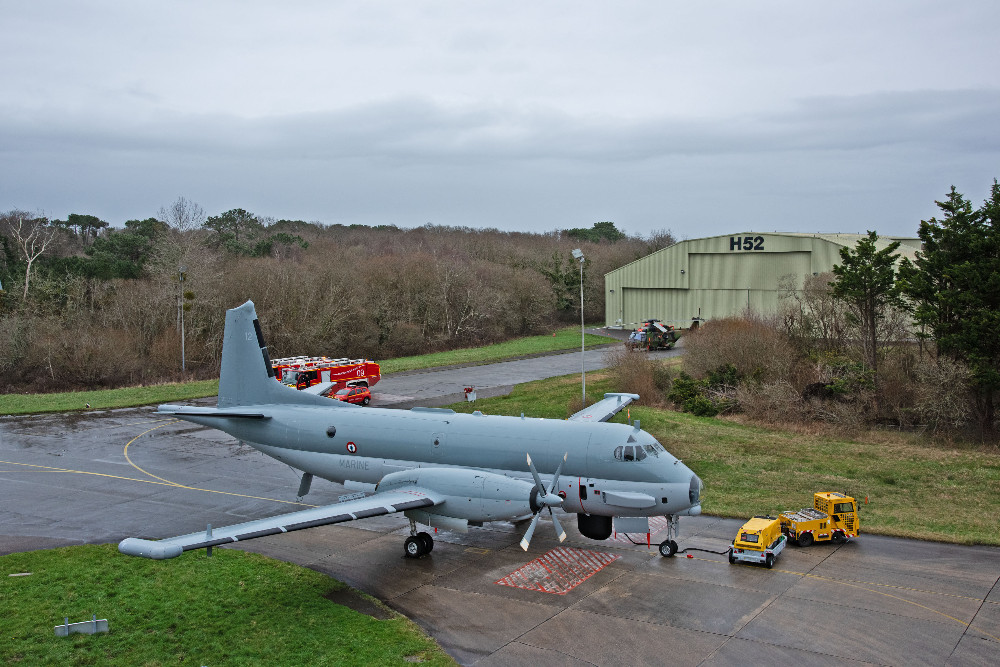Edition anglaise

February 2007 - n° 694
The security of France - Jacques Chirac
Excerpts from the speech by President of the Republic, on the occasion of the presentation of New Year greetings by the Armed Forces, Elysée Palace, Monday 8 January 2007 (www.elysee.fr). Read more
ESDP in the second half of 2006 - Fabien Terpan
During the second half of 2006, the European Security and Defence Policy continued to make progress, in terms both of missions undertaken and civilian and military resources committed. The Euro-American crisis over the Iraq war, the setback to the Constitutional Treaty, the enlargement in 2004; none of these appear to have put a brake on the Union’s move towards stronger operational capability, even if it is not certain where it is heading. New operations are scheduled in Afghanistan and in Kosovo. Fresh objectives, in the short or long term, should contribute to a clearer definition of ESDP as an operational instrument. The European Defence Agency is performing its role in the development of capabilities and in forming a European armaments programme. The integration into ESDP of some political considerations, such as human rights and equality of the sexes, should also be noted.
The European Security and Defence College: a success story? - Michel Monnier, Jean-Luc Cuny
The European Security and Defence College (ESDC), which has been in operation since September 2004, is the embodiment of an old idea. This ‘virtual’ college, made up of a network of national institutions, has as its main aim the training of officials at the strategic level in the field of European security and defence policy, in order to promote a common understanding of the policy. Its objectives and general functioning will be discussed in Brussels in the coming months, to ensure its continuance.
OCCAR is ten years old - Jacques Sauvaget
To mark the tenth anniversary of the Organisation for Joint Armaments Cooperation (the French abbreviation OCCAR is normally used), this article relates the creation of this organisation, which was the first European structure designed to improve cooperation on armaments.
Riga: a minor summit? - Olivier Kempf
To all appearances the Riga summit seems a minor one: few decisions were taken because Afghanistan was the major topic of discussion. The only thing that was new was the offer of a partnership with Serbia and Bosnia. This was hardly surprising, since many issues (including the contact group on Afghanistan, partnership and energy security) had been left at working group level, and with the Secretary General in particular. All of which serves to illustrate the lack of political declarations, the lack of inspiration and the lack of drive. To the satisfaction of France the idea of an overall partnership was postponed until a later date. Read more
Russia-EU: in search of an energy strategy - Céline Bayou, Pierre Verluise
EU member states have become increasingly dependent on Russian oil. Moreover, their industries are seeing the agreements signed during the Yeltsin years being called into question . . . and the price they have to pay for the opportunities they once dreamed of is increasing as well. On the other hand Russia is now deriving significant financial and strategic advantage from its oil. Claiming protection of its own interests, it wants to impose its control over extraction and its monopoly of transport while also profiting from the opening up of European markets to establish itself there. The resulting strategies seem a priori incompatible.
Space policy and European sovereignty - Jacques Favin-Lévêque, Alain Terrenoire, Jean-Claude Empereur, Jean-Paul Baquiast, Patrick Bellouard, Pascale Sourisse, Roberto Leonardi, Philippe Douste-Blazy
A summary of the proceedings of the Space Policy and European Sovereignty Symposium, presided over by M. Philippe Douste-Blazy, Minister for Foreign Affairs and President of the Greater Toulouse region. This Conference was organised by PanEurope France on 17 November 2006, in partnership with the city of Toulouse and the Greater Toulouse urban area community, with the aim of publicising the connection between the definition and implementation of a space policy, and European independence and sovereignty.
Instruments for ensuring Europe's independence - Henri Grossouvre (de), Christophe Blanc
A report of a seminar held by the European Academy, Forum Carolus, the Rhine-Volga Association and la Lettre Sentinel at the Council of Europe, Strasbourg, on 5 October 2006.
The creation of Aerospace and Transport Industrial Campus and ID advance - Henri Grossouvre (de)
The ID Advance Aerospace and Transport group and the Aerospace and Transport Industrial Campus association were created near Strasbourg at the end of 2006. They were formed from the Forum Carolus think tank with the aim of bringing together the major groups, small- and medium-sized firms, and R&D centres active in these sectors in the upper Rhine region, at the meeting-point of three key countries (France, Germany and Switzerland). ID Advance and the Campus association are in the right place at the right time to fill niches and invest in their geostrategic location: half-way between Hamburg and Toulouse and at the gateway to a Central and Eastern Europe at last reunited with Western Europe.
The European Maritime Safety Agency is on course - Francis Vallat
Over the last four years the European Maritime Safety Agency (EMSA) has been working to establish itself in the field of maritime transport safety and environmental protection, in sometimes difficult circumstances. Its successive annual reports and Internet sites describe its organisation and resources, and illustrate the importance of the increasing number of missions which it is conducting with perseverance and competence. Nevertheless, too few consult it or are aware of its encouraging progress. Analysis . . . and comment.
The Poseidon Report - Sophie Boissard
The Poseidon Report was produced at the direction of the Prime Minister by the Secretariat-General for Maritime Affairs (SGM) and the Centre for Strategic Analysis (CAS). It makes recommendations for an integrated maritime policy, along the lines of the European Commission’s Green Paper (www.sgmer.gouv.fr and www.strategie.gouv.fr).
Maritime safety and naval architecture - Fabrice Quénéhervé
The EU and the IMO are working to harmonise and improve the rules for design and build of merchant ships. The immunity given to warships spares them from the burden of this set of standardising rules and regulations, which do not take into account their technical and operational peculiarities. Given the wealth of feedback from the world’s merchant fleets, some of these technical recommendations could nevertheless prove to be beneficial to warships. As a consequence of the change in status of the DCN, the French Navy is increasingly calling upon civil shipbuilding yards and classification companies, and is looking seriously at closer similarity between warship build standards and those for methodology and design applicable to the merchant navy.
The mission of the Center for Strategic Analysis - Sophie Boissard
The need for centres of expertise and aid to multidisciplinary decision-making has never been more evident, in an increasingly complex institutional environment rife with European and international problems. The Decree of 6 March 2006 which created the Centre for Strategic Analysis was aimed at meeting this need, and reflects a desire to refashion official decision-making methods. Read more
French security planning - Guy Le Borgne
At present, the overall French security system is based on two mechanisms, one of which deals with the general security of people and goods, while the other concentrates on the protection of vitally important activities. Read more






_astronaut_Sophie_Adenot_(jsc2025e058846_alt).jpg)

